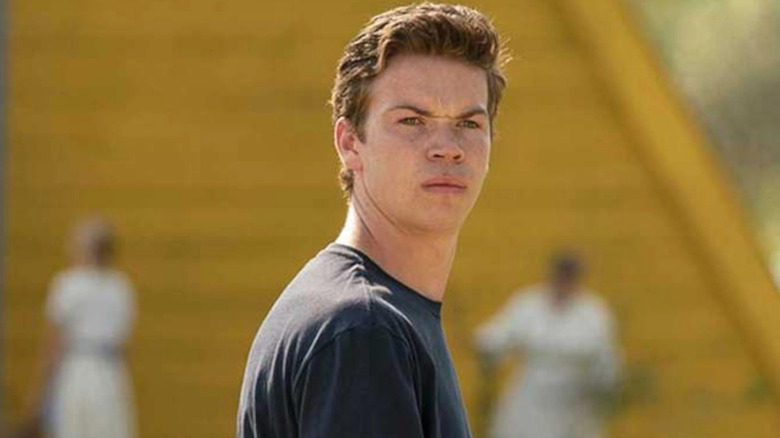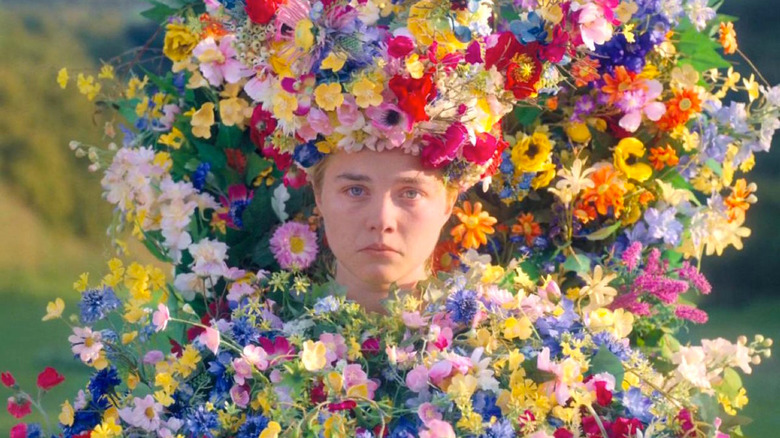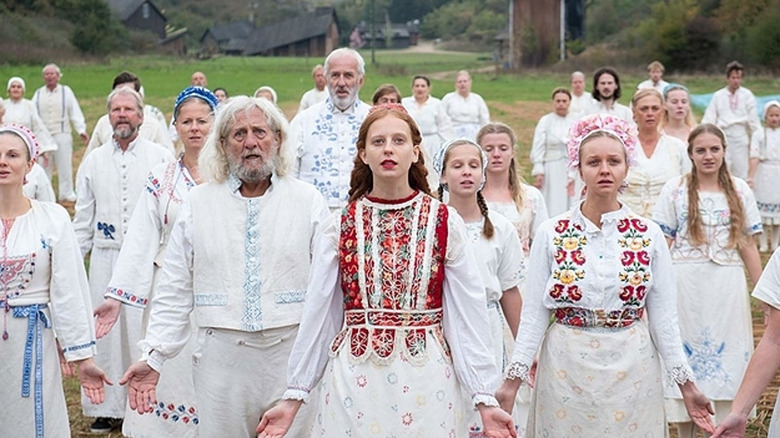Even Will Poulter Was Disturbed By Midsommar — Here's Why
Will Poulter is no stranger to the world of off-kilter horror. Back when Cary Fukanaga was attached to direct an adaptation of Stephen King's "It," Poulter had plans to don the clown suit and become a thing of nightmares. As Pennywise the dancing clown, he would've delved into the sewers as the walking embodiment of pure evil, but when the project fell through and a new adaptation entered the development stage, Poulter passed on the opportunity to actually fill the role. But that wasn't the last time he walked an eerie path.
Just a few years later, Will Poulter ended up starring in Netflix's interactive "Black Mirror" episode "Bandersnatch." Clearly a fan of interactive stories, he'd later snag a role in the Supermassive Games horror survival series, "The Dark Pictures Anthology." But while both projects have their fair share of disturbing themes, there's an entirely different film that haunts Poulter to this day: Ari Aster's sophomore feature, "Midsommar."
The haunting nature of Midsommar
In case you haven't had the pleasure of being traumatized by Ari Aster, here's what you should know: "Midsommar" is the story of American couple Christian (Jack Reynor) and Dani (Florence Pugh) who, despite their strained relationship, embark on a trip to Sweden with some friends. Among their traveling companions is Pelle, a Swedish native who invites them back to his remote ancestral village to witness its famed midsummer festival, where everything is fine and nothing bad ever happens ... just kidding! Their so-called idyllic retreat is soon plagued by sorrow, violence, and the kind of imagery ready to sear itself into your brain forever!
As all viewers can attest, Aster's film is exceedingly effective at that last bit. Poulter himself is walking proof, because when he caught up with The Independent to chat about the film, he had just spent time at the Glastonbury Festival, where the images of "Midsommar" continued to haunt him:
"I've got to say that being out in the sun at Glastonbury and seeing the odd person with flowers in their hair did trip me out a bit."
Who among us doesn't wince in fear when we see women with bright flowers in their hair? Fools, that's who! Those of us in the know are rightfully terrified of anything even tangentially related to "Midsommar." Poulter went on to explain that the scares in this film can't be waved away with disbelief of the supernatural because they go eerily deeper than that.
"What you come to terms with pretty quickly is that there aren't ghouls or goblins in Midsommar; everything that is horrifying comes from a very organic place and all the terrible things that happen are enacted by humans on humans. That's really quite disturbing to me."
Not your traditional horror movie
So what makes "Midsommar" so scary? If you saw a stray clip from the film — a woman drenched in sunlight, walking through a grassy field with flowers in her hair — horror might not be your first thought. But actually experiencing the film is something else entirely. The oddness of it all is what drew Will Poulter to the script in the first place. While chatting with Nightmarish Conjurings, he unpacked the ways that Aster's haunting film spans across tones and genres:
"You could describe it as a psychedelic thriller, you could explain it as a kind of trippy horror film, but you could also describe it as a film that is about human relationships. About grief, about empathy, about our capacity for empathy when faced against the tide of grief and in the context of a toxic relationship – it's all these that are innately more interesting and human to me. I love the fact that he delves into that."
"Midsommar" is a rare horror movie that doesn't lurk in the shadows, but instead embraces the power of sunlight. There is nowhere to hide in the festival's perpetual daylight: Trauma must be confronted and inner selves beg to be revealed. In some of the film's most horrifying moments, that happens in a very literal, grotesque way — Aster embraces gore with an unflinching camera and there's no shortage of grisly deaths to prove it. Between that imagery, the dark, festering themes, and the claustrophobic tension that builds over the course of the film, it's no surprise that "Midsommar" leaves such a lasting mark on its audience.


